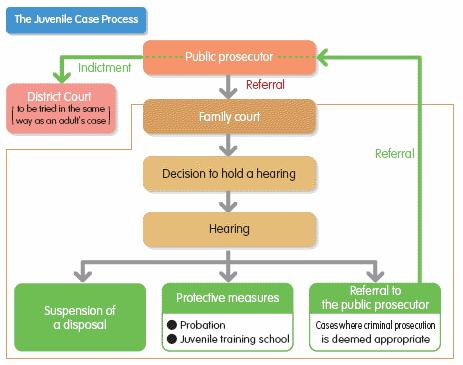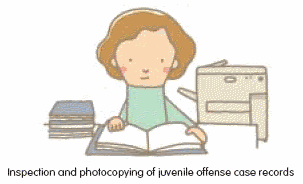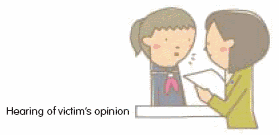

Once a public prosecutor has completed the investigation regarding a juvenile offense, the case is referred to the Family Court. The Family Court examines the records of the offense committed by the juvenile referred by the public prosecutor and the findings of the Family Court Probation Officer, and decides whether or not to hold a hearing. When a hearing is held, it is done in private. The public prosecutor does not usually attend the juvenile hearing, but occasionally he/she participates if it is deemed necessary for fact finding purposes.
If the court finds the facts of delinquency and deems that a protective measure is appropriate, then the juvenile is placed under a protective measure such as commitment to a juvenile training school, a support facility for development of self-sustaining or a children’s home, or being put on probation. However, if the nature or circumstances of the crime is such that criminal punishment is deemed to be more appropriate than protective measures, the court decides to refer the case back to the public prosecutor (reverse referral).
If the public prosecutor who receives such juvenile case deems that the charge is well-grounded, then the prosecutor indicts the case to the criminal court.

 |
What sorts of measures have been introduced into the juvenile trial process to support the crime victim? | |
 |
Following measures have been introduced for the victim of juvenile crime and the families:
|
|

If the victim or the bereaved families makes a request, they are, as a general rule, allowed to inspect and photocopy the records of the juvenile hearing (excluding so-called social records which reports surveys concerning the necessity of protection of the juvenile), except for the case where such request is made without reasonable grounds or is not deemed as appropriate.



Upon request, victim or the bereaved families can state their feelings and opinions:

With regard to cases where the offender has killed or injured a victim in an intentional criminal act such as murder or bodily injury, or traffic case of bodily injury or death (*1 and *2), the victim and the bereaved families are allowed to attend the juvenile hearing upon request, when it is deemed appropriate and unlikely to impede the healthy development of the juvenile.

The victim and the bereaved families can, at their request, receive explanation about the circumstance of the hearing from the Family Court, when it is deemed appropriate and unlikely to impede the healthy development of the juvenile.

The victim and the bereaved families can, at their request, receive notifications of the case such as juvenile’s name and the result of the hearing from the Family Court, when it is deemed appropriate and unlikely to impede the healthy development of the juvenile.

The victim and the bereaved families can, at their request, receive notifications of the juvenile’s treatment, for example, how the perpetrator (juvenile), who was placed under protective measures at the juvenile hearing, is being treated at the juvenile training school or under probationary supervision.
The following information can be included in the notification:

If you would like to request things mentioned in (1) to (5), please ask at the Family Court.
If you would like to request notification mentioned in 6:
Please ask the nearby juvenile classification home concerning perpetrator committed to the juvenile training school; or
Please ask the probation office located in your prefecture concerning perpetrator placed under probation.
If you have any questions about these systems, please ask the public prosecutor in charge or the assistant officer, or Victim Support Officers.
In addition, when a witness is questioned at the Family Court, witness attendant, witness screens, and video links for remote witness examination are also available.